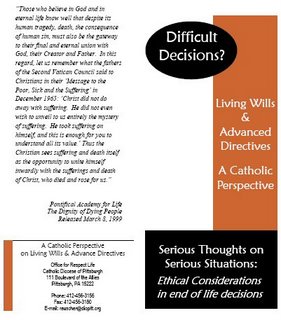Vatican Favors Living Wills

In an article dated October 19, 2006, entitled "Top Vatican official reiterates opposition to euthanasia, favors 'living will'", the Associated Press reported:
The Vatican's top official for health issues reiterated the Catholic Church's strong opposition to euthanasia in an interview published Thursday, but said it was in favor of allowing terminal patients to opt against aggressive therapeutic treatment.The article was made available online here by the International Herald Tribune. It continued:
Cardinal Javier Lozano Barragan's comments came as an Italian Senate committee has been hearing arguments over proposed legislation to approve a living will — allowing people to decide in advance how they want to be treated if they become incapacitated in the last stages of a terminal illness.
Barragan spoke in favor of a living will, telling Turin daily La Stampa that the Vatican opposed "those useless and disproportionate treatments before the imminent death of the patient, which have as sole consequence prolonging the agony."The Catholic News repeated these points & quotes in its online article entitled "Vatican health official backs living wills", dated October 20, 2006, found here.
He clarified that hydrating and feeding a terminal patient could not be considered aggressive therapeutic treatment.
"In no way, however, are we in favor of the idea of euthanasia — meaning that action, or omission — destined to cause the death of the patient," Barragan added.
The website ABOUT, offers a summary & two good references regarding Catholicism's view of a "living will", as follows:
A living will is very important in Catholicism because it says what you want when you cannot speak for yourself.The latter link explains, in a Question & Answer format, the Catholic teaching on "extraordinary means" of preserving life.
This article explains the Catholic living will - Catholic Living Will.
Also read End of Life Decisions on EWTN.
Q. What can a person do to ensure that their wishes and their religious beliefs are respected by their family, medical personnel and the courts?
A. The best way is by means of an Advance Directive which states the patients wishes with respect to aggressive medical treatment. There are two basic kinds, a Living Will by itself or an Advance Directive with a Durable Power of Attorney (or Proxy) for Health Care Decisions. The merits of each are as follows:
1. Living Will. By this document a person decides completely in advance whether they want to be kept alive by technology. It is a "yes" or "no" statement, which then places the matter in the hands of the medical community. Many Catholic bishops and moralists consider this an unsatisfactory approach, as it does not provide for unforeseen circumstances. Despite the enthusiasm of the media, many medical professionals, and sadly even some Catholic institutions, Living Wills are NOT the way to go!
2. Advance Directive with a Durable Power of Attorney or Health Care Proxy. These documents give to a friend or family member the authority to make health care decisions according to one's mind as expressed in an Advance Directive. By appointing an agent, or giving someone durable power of attorney, the patient allows for unforeseen circumstances. By stating in an Advance Directive that one wants Catholic teaching adhered to, one can ensure that neither the agent or the medical institution will disregard that teaching. Together they ensure that a trusted person, rather than strangers, will make circumstantially appropriate decisions, in keeping with the Faith. * * *
That article concludes by suggesting sources for "living will" forms acceptable for use by Catholics, provided through the courtesy of the National Catholic Bioethics Center, of Philadelphia, PA, including:
In an article found online here, the Florida Catholic Conference reviewed the history of Catholic views on "end-of-life" decisions & "living wills", and offered forms acceptable under Florida law for Catholics, based upon the 2001 version of a "Catholic Declaration on Life and Death".
In February, 2001, the Catholic Diocese of Pittsburgh published its pamphlet (see graphic above) entitled "Difficult Decisions? -- Living Wills & Advance Directives -- A Catholic Perspective", available online here, regarding these end-of-life decisions in Pennsylvania under then-applicable law. But that law soon will change when Governor Rendell will sign Senate Bill 628 into law, as much discussed previously on this blog.
Most recently, on March 20, 2005, the National Catholic Bioethics Center published "A Catholic Guide to End-of-Life Decisions -- An Explanation of Church Teaching on Advance Directives, Euthanasia, and Physician Assisted Suicide", which is available online here. It references the form of an "Advanced Medical Directive and Health Care Proxy", which is only available by order from NCBC's Publications Department. Click here to order this guide on-line.
Senate Bill 628 -- as approved unanimously by the Pennsylvania Legislature and as now awaits signature by the Governor -- will accommodate Catholics who desire to act under the guidance offered by their Church to date. It is sufficiently broad so that persons of other religions or personal beliefs likewise will be able to follow their views in the making or refusing of health care decisions, short of euthanasia.
Note: I am not Catholic. So, if I am incorrect in my analysis, please forgive me, and then correct me.
UPDATE: 01/13/07:
The Associated Press distributed an excellent article entitled "Catholics seek guidance on end-of-life issues" [link expired], published on January 12, 2007, in the Reading Eagle.
Update: 09/24/07:
For the Catholic Church's reaction on a somewhat related issue, see: PA EE&F Law Blog posting, "BODIES" in Pittsburgh, with Reactions (09/24/07).
Update: 02/27/08:
For a further update about the Vatican's stance on end-of-life decisionmaking, see: PA EE&F Law Blog posting "Catholic Congress Studies End-of-Life Issues" (02/27/08).

